By Vivek Paudel
“Makerspaces like Maker’s Edge have great promise for the 21st-century economy.” – Jessica Attas, Greater Waco Chamber of Commerce.
A hidden diamond in a coal mine can only get its worth if people who know the value of a diamond reach to it.
Located at 1800 Austin Ave, The Maker’s Edge is, to me, one of Waco’s hidden diamonds. Maker’s Edge is Waco’s “makerspace.” If you are not familiar with the concept of a makerspace, it’s like a big community workshop for making things.
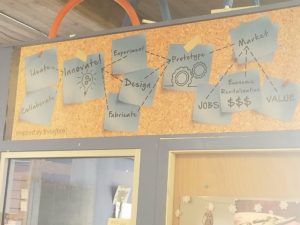 Maker’s Edge provides a space for creation, customization, innovation, and experimentation in our community. It’s a place where people from nine to ninety-nine go to make their imaginations real. Whether you are an artist who wants to do some customization on a personal item or a student who needs to build a science project, Maker’s Edge provides all sorts of guidance and an expansive variety of equipment.
Maker’s Edge provides a space for creation, customization, innovation, and experimentation in our community. It’s a place where people from nine to ninety-nine go to make their imaginations real. Whether you are an artist who wants to do some customization on a personal item or a student who needs to build a science project, Maker’s Edge provides all sorts of guidance and an expansive variety of equipment.
 This is no small room with a few LEGO sets and a 3D printer. Maker’s Edge provides a full shop experience with more machines and space than many might realize is available here in town. Equipment available includes a CNC Router, 3D printers, plasma cutter, drill press and much more that makers can use for purposes from customizing a cell phone case to building a prototype of a new product.
This is no small room with a few LEGO sets and a 3D printer. Maker’s Edge provides a full shop experience with more machines and space than many might realize is available here in town. Equipment available includes a CNC Router, 3D printers, plasma cutter, drill press and much more that makers can use for purposes from customizing a cell phone case to building a prototype of a new product.
Melissa Pardun, the owner of Maker’s Edge, calls it the “democratization of heavy machines.” Through Maker’s Edge, and other makerspaces, anyone can use expensive tools that otherwise they would not be able to afford. Anyone can make a prototype of the idea they have been carrying around in their head. This opens up the possibility of making tons of money as well as benefit to the community.
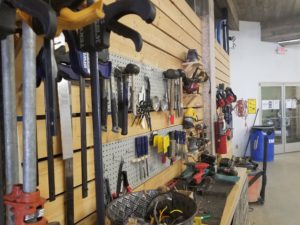 Not only does Maker’s Edge make the machines available to customize items and build prototypes, it also provides a place to connect with others and share ideas. For example, if different people take advantage of this space to customize their stuffs — which can include anything from improving the look of their cell phone case to building a bookshelf — this will not only increase the creativity of those people, but can simultaneously help in exploration of new ideas for customizing.
Not only does Maker’s Edge make the machines available to customize items and build prototypes, it also provides a place to connect with others and share ideas. For example, if different people take advantage of this space to customize their stuffs — which can include anything from improving the look of their cell phone case to building a bookshelf — this will not only increase the creativity of those people, but can simultaneously help in exploration of new ideas for customizing.
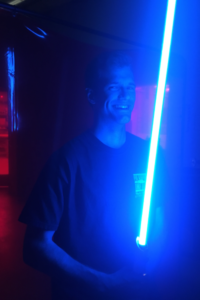 All these options and machines may seem overwhelming. But, I encourage anyone who has something in their mind to head over to Maker’s Edge and create it. The people at Maker’s Edge will provide the guidance and help to help you create your prototype. I have seen people create remarkable objects from lightsabers from Star Wars, to Harry Potter wands and much more. When people participate and work on a project, that builds up and improves creativity. At Maker’s Edge people are able to polish their arts and imaginative skills. The people at Maker’s Edge provide a helping hand and help in cases of failure because they believe in learning through failing. When people carry that perspective into the workshop, great results will follow.
All these options and machines may seem overwhelming. But, I encourage anyone who has something in their mind to head over to Maker’s Edge and create it. The people at Maker’s Edge will provide the guidance and help to help you create your prototype. I have seen people create remarkable objects from lightsabers from Star Wars, to Harry Potter wands and much more. When people participate and work on a project, that builds up and improves creativity. At Maker’s Edge people are able to polish their arts and imaginative skills. The people at Maker’s Edge provide a helping hand and help in cases of failure because they believe in learning through failing. When people carry that perspective into the workshop, great results will follow.
It’s even a stress reliever. Taking a pottery class at Maker’s Edge and getting your hands into some clay and mud is a great way to relieve the daily stress. Getting involved in a class can also help you meet new people; some nice small talk with a new person can be a good stress reducer too. If you are dealing with anger, use that anger and put it into building something that will be productive. If nothing else, Maker’s Edge is a place where slamming a hammer on a wooden plank is considered a productive task!
Maker’s Edge is a treasure chest for Waco, and more Wacoans need to know about it and take advantage. We, as a part of community, need to invest our time in understanding about them and utilizing the things they have been providing. They provide free classes where anyone can test it out without risking finances. An engine of creativity like Maker’s Edge should be booming in the center of our community rather than being at the unfamiliar edge.
 Vivek Paudel is a student at MCC pursuing an Associate in Arts for Digital Media. He is an expert when it comes to eating and travelling, and he listens to rock music whenever he feels low. He loves to write stories that are posted on his blogspot account. He likes to interact with people about different stuff, and he knows how to fill those awkward silences.
Vivek Paudel is a student at MCC pursuing an Associate in Arts for Digital Media. He is an expert when it comes to eating and travelling, and he listens to rock music whenever he feels low. He loves to write stories that are posted on his blogspot account. He likes to interact with people about different stuff, and he knows how to fill those awkward silences.
The Act Locally Waco blog publishes posts with a connection to these aspirations for Waco. If you are interested in writing for the Act Locally Waco Blog, please email [email protected] for more information.
By Chelsea Phlegar
May is National Bike Month! According to the League of American Bicyclists, National Bike Month was established in 1956, and is a chance for communities across the country to showcase the many benefits of bicycling — and encourage more folks to giving biking a try!
Fostering bike culture and expanding opportunities for bicyclists in Waco is important for a lot of reasons: riding a bike is cheaper than driving a car, and a bike is sometimes the primary mode of transportation for those who don’t have access to or can’t afford a car; riding a bike promotes individual health; bicycling instead of driving helps to reduce emissions and preserve clean air in our community; and exploring our community by bike is a way to discover the hidden gems in Waco that you may otherwise miss while driving a car. Whenever a person chooses to ride their bike they potentially free up a parking spot for someone else. That is Waco Friendly!
Last year, the Waco Metropolitan Planning Organization (MPO) issued an online survey where we asked people to tell us about their transportation and travel habits. Unsurprisingly, when asked how they usually travel around town, over half (56%) of respondents answered “drive by myself,” as compared to 13% percent that answered “ride my bike.” However, when asked how they would prefer to get around, the percentage of car-based trips decreased substantially, and trips made primarily by biking (or walking) increased, such that the preference for driving, walking, and biking was fairly evenly split (between 25% and 27% each).
When we asked more detailed questions about survey respondents’ experience with biking as a mode of transportation (as opposed to recreation), it became clear that lots of Wacoans want to get on their bikes but are prevented from doing so, or are hesitant, for a few common reasons:
- They don’t know safe routes to ride
- There aren’t many bike lanes or bike paths that are separated enough from vehicle traffic to make them feel comfortable to ride (either by themselves, or with their families)
- And they don’t feel confident that people driving their cars will know how to share the road in a way that is predictable and safe for everyone
One way to tackle these concerns is to build out our community bike network, and expand education and safety materials, with the novice bicyclist in mind. The novice bicyclist feels comfortable on lower-speed roads where motorists expect to see people on bikes, and prefers to be physically separated from cars when possible (such as buffered bike lanes and off-street bicycle/pedestrian paths or trails). The MPO is working on an Active Transportation Plan that will help to guide expansion of the bicycle network in the future. The plan will incorporate a lot of the feedback that was received from the online survey. However, in the meantime, here are some available resources that may help to address these common concerns:
I don’t know safe routes to ride! The MPO has developed a bicycle suitability index that is available online (here). This index rates arterial or collector streets in city limits (and several county roads) on a sliding scale, based on the potential level of comfort for a novice bicyclist. Rating levels include Easy, Moderate, Difficult, Not Recommended, Extreme, Under Construction, Prohibited, and Not Evaluated. Roadways in Waco city limits that don’t have a rating are usually “local” neighborhood streets, which are typically lower-speed, lower-vehicle-volume roads that may be comparable to an Easy or Moderate rating. The suitability index considers factors such as vehicle speed, traffic and truck volume, on-street parking, slopes/hills, land uses, etc.
There’s no place to bike! In McLennan County, we have 24 miles of bicycle infrastructure on the ground (including bike lanes, signed bike routes, and off-street multi-use paths such as the riverwalk and Cottonbelt Trail. The city of Waco has made a lot of progress over the past few years in expanding opportunities for biking in our community. For example, a new section of the riverwalk opened in late 2017, which means there is now a 5.5 mile continuous off-street loop for pedestrians and bicyclists along the Brazos River. Buffered bike lanes are available for use along Panther Way, and upcoming capital improvement projects will offer additional bicycle/pedestrian connectivity along Ritchie Rd and in the vicinity of Midway High School. In 2017, the City of Waco installed new bike route signs along University Parks and 11th/12th Streets. Also in 2017, the city was awarded two competitive grants to improve pedestrian and bicycle connectivity. The first will include upgrading the newly signed bike routes on 11/12th Streets to striped bike lanes (construction expected later this year). The second project will include bicycle accommodations starting at University Parks Drive, heading up the Washington Avenue Bridge, and up Elm Avenue to Forrest St. This will include a combination of bike lanes and shared lanes with pavement markings (sharrows), and construction is expected to start in 2019. The city is also exploring the possibility of starting a pilot bike share program.
I’m scared of the cars! The MPO has been working with the Waco Bike Club to develop or distribute educational materials focused on bike safety. However, this is an area that will require more focused effort in the near term. In the meantime, the city of Waco has applied for recognition as a Bicycle Friendly Community. As part of this application process, the city will receive advice on how to improve in areas such as education and safety training. However, one way that everyone can help is to build and promote bike culture in Waco. Bicyclists also drive cars too — so the more people we can encourage to get out there and ride their bike, the more informed drivers we will have on the road.
Another way to get more comfortable biking is to participate in a group ride. The Waco Bike Club is one organization that regularly sponsors these events and welcomes riders of all experience levels. You can check out their Facebook page (here), for upcoming events. Specifically for Bike Month, the Waco Bicycle Club is inviting you to participate in two events:
Ride of Silence, Wednesday May 16, 7 PM to 8 PM
Meet at the fountain in Heritage Square, View the event page on Facebook (here).
On May 16, Waco will participate in the national Ride of Silence ride to honor and remember those who have been injured or killed while cycling on public roadways in our community, and increase bike safety awareness. The Waco ride will include a stop at the White Bike on Franklin Ave to remember David Grotberg.
Critical Mass, Friday May 25, 6 PM to 7 PM
Meet at the fountain in Heritage Square, View the event page on Facebook (here).
Critical Mass is a community bike ride occurring on the last Friday of every month. Rides start downtown at the Heritage Square fountain (in front of City Hall) at 6:00 pm. Generally the ride is about 7 miles long (approx. 1 hour). In the past, Critical Mass rides have meandered along the Brazos, explored Elm Avenue, and cruised through Oakwood Cemetery. Critical Mass is open to riders of all experience levels, although children should be accompanied by an experienced adult. If you’re bringing your kids, we encourage you to practice riding before attending (more biking, yay!).
We hope that our pleasant spring weather and longer daylight hours motivates you to get out and ride your bike during Bike Month!
 Chelsea Phlegar, AICP, is a Senior Planner with the Waco Metropolitan Planning Organization. She also serves as the MPO’s active transportation coordinator, and spends her days working to improve multi-modal connectivity in McLennan County. On the weekends you can find her snacking her way through the Waco Downtown Farmers Market or “running” along the riverwalk.
Chelsea Phlegar, AICP, is a Senior Planner with the Waco Metropolitan Planning Organization. She also serves as the MPO’s active transportation coordinator, and spends her days working to improve multi-modal connectivity in McLennan County. On the weekends you can find her snacking her way through the Waco Downtown Farmers Market or “running” along the riverwalk.
The Act Locally Waco blog publishes posts with a connection to these aspirations for Waco. If you are interested in writing for the Act Locally Waco Blog, please email [email protected] for more information.
by Bill Gaventa
This month is Autism Awareness Month. The Heart of Texas Autism Network sponsors a number of wonderful activities in pursuit of recognizing children and adults on the autism spectrum as full members of our communities. Last month was Developmental Disabilities Month and well as national Traumatic Brain Injury Month. March also included an international Down Syndrome Day (March 21).The last week of September is an International Deaf Awareness Week. October is both national Disability Employment Month, and National Mental Illness month, followed by November as national Alzheimer’s Awareness month, a month started by a proclamation from Ronald Reagan. There are multiple others. One could go on and on.
What’s more, each of those awareness months and days compete with other kinds of awareness campaign that have nothing to do with disabilities. You name it. There is probably a day for it. I remember a commentary about all of this on NPR a long time ago, with the speaker yearning for the possibilities of a “National Nothing Day,” one that would probably be appreciated by many as long as they did not have to sign declarations about it, lead public relations campaigns, or do the multiple other things that one has to do in order to help one of these days or months become something more than “in name only.”
Of course, all of these groups know that awareness is something they yearn for all year round. There are daily needs that go unseen and unmet, assumptions and stereotypes that go unchallenged, and both people and caregivers who go forgotten and unsupported.
Many also know there is a double edge to special awareness days, weeks, or months. Calling anything “special” can unwittingly imply that that people are more different than alike, that special skills are needed to be human and hospitable with another, and that specialized programs are more important than friendship and being part of neighborhoods, congregations, clubs, and community activities of all kinds. Hopefully, one day, “special” becomes unnecessary, because everyone is treated as unique and valued, receivers and givers, citizens and potential friends. Everybody, as Nigerian novelist Chimamanda Adichie
says in a famous TED talk, is more than a single story. In fact, she says it more forcefully: There is danger in being seen as having a single story.
But we are not there yet. People with disabilities, their families and friends, and organizations that support them all need supporters and allies as the work of weaving people into community life goes on, and they are known as people with multiple interests, gifts, and stories.
If you stopped for a moment to ask, “Do any of these groups work together, the answer is “Yes.” Waco is lucky enough to have several organizations that seek to link these individuals, families, organizations and services together. One of them is the Waco Mayor’s Committee for Disabilities.
It’s a mouthful of a name. It sounds formal and official, but truth be told, it is neither. It is one of those organizations that only exists because of the voluntary commitment and work of the people and organizations who choose to be involved. No one’s paid. We get by financially with the help of our friends, organizations and businesses who help donate to, and sponsor, two major events each year for people with disabilities, their families and friends: The Starry Night Holiday Celebration during the Christmas season, and Join the Pride, the upcoming free day at Cameron Park Zoo (April 22) that also serves as an information and resource fair for people with disabilities, their families, and friends.
What else do we do? We have been thinking about that, and have a vision of serving as a collaborative, active network that can (1) respond as a team to people and families searching for services and supports, (2) share information with one another on new and exciting ideas and supports, and (3) work together across disability labels and organizations to support one another and to meet needs we cannot by ourselves.
Many cities established Mayor’s Committees several decades ago. Many of those have withered on the vine. Some key people in McLennan County, including Darlene Nobles of Signs of the Times, Anita Karney of the Heart of Texas Autism Network, and Kelly Yarbrough, formerly of DARS but now of the Texas Workforce Coalition, have helped keep the Waco Committee alive. Now there are new voices wanting to strengthen current projects and do things together that we cannot do separately. The key phrase these days in human services, as in other arenas, is taken straight from the farm: Get out of our silos and talk to one another.
Anyone’s welcome to join in as a member (no dues), participant, advocate, and worker. If you come with curiosity, we can hopefully answer questions. You don’t need to fill out forms. If you come with ideas and dreams, be prepared to work on them. We may not yet have all the supports and services people need, but through this Committee and network, you’ll have allies, people willing to listen, and others willing to celebrate the wide diversity of ways that people and groups in Waco are working to give everyone the chance to participate in the community as they wish. As Waco begins to grow and thrive, let’s help the lives of those with one form of disability or another flourish as well, and become known more for their grit, gifts, and desire to contribute to this community as well.
How to get started? Email [email protected], and Like the Waco Mayor’s Committee for Disabilities on Facebook. Put out a question there. And share information. Find out about next meetings. (usually once a month) Come to Join the Pride on Sunday, April 22, and meet a bunch of the people involved. Join the Pride started because the lion’s pride at Cameron Park Zoo once had a lion who was shunned by the others because of a disability. So the founders wanted to be part of her pride, at least symbolically. Now, we have a zoo that is known for its skills in rehabilitation of animals, and multiple support organizations seeking to help individuals and families feel pride in their own lives and community. We need dreamers and workers. Everyone has gifts. It is our job together to find ways to use them.
Here’s the information about Join the Pride… be sure to register online so we have an idea who is coming. To request free tickets for families with special needs children, adults with disabilities, or veterans with disabilities and a guest, visit: http://www.tinyurl.com/2018JTPZooTickets or email [email protected]
To sponsor a family or for a free booth register at: http://www.tinyurl.com/2018JTPBoothSponsor.
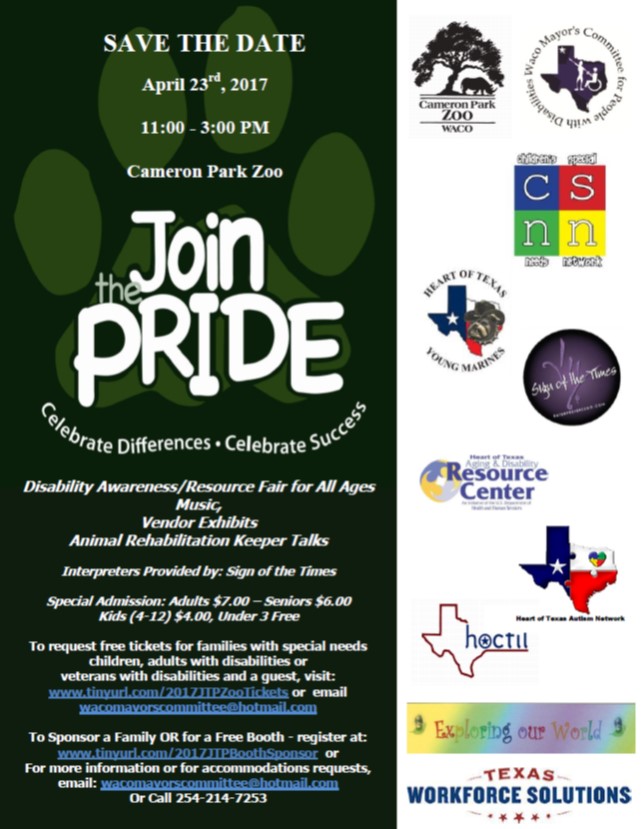
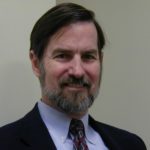 Bill Gaventa is the Current Co-Chair, Waco Mayor’s Committee for Disabilities. He is an ordained Baptist minister currently serving as the Director of the Summer Institute on Theology and Disability and the national Collaborative on Faith and Disability. Bill’s pastoral career has been in a variety of roles at the intersections of faith and disability, including community supports with people with disabilities, training for clergy, seminarians and community services staff, aging and end of life/grief issues in intellectual and developmental disabilities, cultural competence, and community building. He served as the President of American Association of Intellectual and Developmental Disabilities for 2016-2017. He and his wife Beverly moved to Waco in 2013 where she serves as Professor of New Testament Interpretation at Baylor University. In Waco, Bill serves on the Mayor’s Committee on Disabilities, the Board of the Arc of McLennan County, and the Professional Network Advisory Committee of the Heart of Texas Region MH/MR Center. You can email Bill at [email protected].
Bill Gaventa is the Current Co-Chair, Waco Mayor’s Committee for Disabilities. He is an ordained Baptist minister currently serving as the Director of the Summer Institute on Theology and Disability and the national Collaborative on Faith and Disability. Bill’s pastoral career has been in a variety of roles at the intersections of faith and disability, including community supports with people with disabilities, training for clergy, seminarians and community services staff, aging and end of life/grief issues in intellectual and developmental disabilities, cultural competence, and community building. He served as the President of American Association of Intellectual and Developmental Disabilities for 2016-2017. He and his wife Beverly moved to Waco in 2013 where she serves as Professor of New Testament Interpretation at Baylor University. In Waco, Bill serves on the Mayor’s Committee on Disabilities, the Board of the Arc of McLennan County, and the Professional Network Advisory Committee of the Heart of Texas Region MH/MR Center. You can email Bill at [email protected].
The Act Locally Waco blog publishes posts with a connection to these aspirations for Waco. If you are interested in writing for the Act Locally Waco Blog, please email [email protected] for more information.
By Andrew Patterson, Kristopher Ruiz & Caroline Capili
400 hundred years ago, immigrants from all over the world boarded ships to escape persecution, to start a new life. A life free from fear, a life with endless possibilities, a life with hope for a better future. Today, that same thing is happening with children ranging from a few years old to teenagers. Only these children are not boarding boats or sometimes not even traveling with their family. These children are jumping on moving trains, trekking across deserts, crossing streams all the while trying to evade those seeking to exploit them. These children are fleeing domestic abuse, violence, poverty, and food insecurity in hopes that they may have a better life and help out their families.
Our project began last fall when we, Caroline Capili, Kristopher Ruiz, and Andrew Patterson signed up for a brand-new class at Baylor University led by Dr. Victor Hinojosa and Dr. Lori Baker focusing on the issue of child migration in the Western Hemisphere with an emphasis on the Northern Triangle countries. We attended weekly lectures, read reports and books, and met with numerous experts in the field. We were asked to develop an innovative project to address the child migrant crisis. We spent many classes going through the process of design thinking to come up with ideas about what we wanted to accomplish and how we were going to do so. After months of going through this process, we agreed that we wanted to bring attention and awareness to this crisis and start a dialogue here in Waco. Once we had this purpose, we thought the best way to approach a problem with multiple facets was through art. We looked up different examples of art exhibits focusing on the issue of immigration, and that’s when we first came across Northern Triangle.
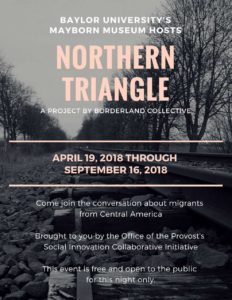 Northern Triangle is an exhibition created by Borderland Collective that opens a space for constructive dialogue and exchange around the current Central American refugee crisis along the U.S./Mexico border and the long and complicated history of U.S. intervention in which it is irrevocably entangled. The exhibit is comprised of pieces such as items collected along the border, pictures drawn by child migrants, news articles, and photographs. Northern Triangle is everything we wanted in an exhibit and more. We found Northern Triangle through one of the guest speakers we had, Mark Menjivar. Mark is a former Baylor student and friend of Dr. Hinojosa. He is one of the lead collaborators of Borderland Collective. Borderland Collective is a long-term art and education project based out of Texas State University designed to engage community members with complex issues in order to foster discussion on those issues. The lead collaborators of Borderland Collective are Jason Reed (Director), Ryan Sprott (Co-Founder), Mark Menjivar, Molly Sherman, Erina Duganne, Daniela Hernandez, and Cacey Wells. Mark Menjivar had been our point of contact with Borderland Collective.
Northern Triangle is an exhibition created by Borderland Collective that opens a space for constructive dialogue and exchange around the current Central American refugee crisis along the U.S./Mexico border and the long and complicated history of U.S. intervention in which it is irrevocably entangled. The exhibit is comprised of pieces such as items collected along the border, pictures drawn by child migrants, news articles, and photographs. Northern Triangle is everything we wanted in an exhibit and more. We found Northern Triangle through one of the guest speakers we had, Mark Menjivar. Mark is a former Baylor student and friend of Dr. Hinojosa. He is one of the lead collaborators of Borderland Collective. Borderland Collective is a long-term art and education project based out of Texas State University designed to engage community members with complex issues in order to foster discussion on those issues. The lead collaborators of Borderland Collective are Jason Reed (Director), Ryan Sprott (Co-Founder), Mark Menjivar, Molly Sherman, Erina Duganne, Daniela Hernandez, and Cacey Wells. Mark Menjivar had been our point of contact with Borderland Collective.
Our panel discussion at the opening night event will consist of three portions. First, Caroline Capili, Kristopher Ruiz, and Andrew Patterson will introduce the project, the process they went through, their goals for this art exhibit, and how those goals brought them into contact with Borderland Collective. Second, Mark Menjivar, Jason Reed, and Erina Duganne from Borderland Collective will discuss the exhibit, Northern Triangle, and explain what they have learned in their time studying this issue’s history and the current state it is in today. Third, Dr. Victor Hinojosa, Dr. Lori Baker, and Dr. Andy Hogue will discuss their many years of work on this issue in the areas of political science and anthropology.
Here are some of our reflections on how this project has affected us:
“This project has given us the opportunity to start a dialogue regarding the issue of child migration and address the misconceptions surrounding it. Tackling this issue starts with education about what is really happening and not just what is portrayed in the media. My perception of this issue changed more and more as I spent time learning about it, and my hope is that this art exhibit does the same with the community. As a college student, I never once thought I was going to be able to participate in a project like this that could actually make a difference in something as important as children risking their lives by attempting to come to America.” – Kristopher Ruiz
“As a college student, I never thought that I would be able to engage with professional change-makers on a weekly basis. Through this project, I have been able to interact with many individuals with big dreams and big ideas. The “wicked problem” of migration from Latin America has been a hot topic in the news lately, and we wanted to create a space to foster conversation about the issue. I hope that this art exhibit will impact the way the Waco community views the migration crisis by showing them multiple perspectives, and allow them to experience the issue in a new light.” -Caroline Capili
“Coming from a state like Wisconsin, I never had much of an exposure to the the child migrant crisis before I signed up for this class. If you asked me last fall what I thought was going to come out of this class, I would never have imagined I would develop such an interest in this wicked problem and become passionate about helping these kids. I never would have imagined bringing an exhibit like Northern Triangle to Baylor. This class has been one of the highlights of my college career and I am immensely grateful for everyone who made this class possible and helped us make this project into a reality.” – Andrew Patterson
April 19 – 6 PM – Northern Triangle Opening Night Event at the Mayborn Museum – The opening night event will be free and open to the public. The Office of the Provost’s Social Innovation Collaboration Initiative (BAY-SIC) will host a conversation at 6 p.m. to discuss the event’s focus: The Central American refugee crisis. If individuals wish to visit the exhibit after April 19, the price is included with museum admission. The exhibit will be on display through September 19. There will also be light refreshments at the event.
 Andrew Patterson is a junior Political Science and Economics Major, from Mukwonago, Wisconsin. Caroline Capili is a Junior, Political Science Major, from Beaumont, Texas, and Kristopher Ruiz is a junior, Political Science Major, from Round Rock, Texas.
Andrew Patterson is a junior Political Science and Economics Major, from Mukwonago, Wisconsin. Caroline Capili is a Junior, Political Science Major, from Beaumont, Texas, and Kristopher Ruiz is a junior, Political Science Major, from Round Rock, Texas.
By Emily Mills
Have you ever watched a fire burn, mesmerized by the flames, rightfully fearful of its power? Have you seen a small flame light up the night, or the tiniest spark begin a raging forest fire? Fire can bring both massive destruction as well as health and life to a community. Fire is primal and ancient, a symbol of the Divine, Holy Spirit…life to humanity. Fire molds, transforms, destroys, and heals.
And such has been the journey of Jesus Said Love, carrying and holding a hot and holy vision that has burned us through and through, leaving us with a blessing. My husband, Brett, and I began reaching women within the commercial sex industry about 15 years ago after our first daughter was born. We had no clue we would be consumed with a love like we had never known. Before hitting the clubs we were singing contemporary Christian/worship music to an audience that largely spoke our same language. It became familiar, lackluster, and cliché.
After our first outreach to strip clubs in Waco, Texas, we began to hold stories of women whose lives were impacted by severe forms of abandonment, neglect, and loss. Then, a spark was lit that would soon burn our “ordinary” lives to dust. The outreaches took on the name Jesus Said Love and a movement across Texas to “awaken hope and empower change” began.
We launched teams in Dallas, Bryan/College Station, Killeen, San Antonio, Houston, and eventually Tyler. We held the love of Christ out like a hot meal to be consumed right then and there, and it was gobbled up. We began advocating for women whose lives were wrecked and hope waned.
Homelessness, addiction, mental illness, attempted suicide, financial instability, transportation issues, single motherhood, dental problems, health issues, lack of education, legal problems, and even human trafficking were all now landing in our laps. These issues were wicked problems and how do you fix problems, but not people? We couldn’t twist love into control and domination, we couldn’t manipulate and call it empowerment. We had to trust in the truth of Love at all costs. We are still learning.
Today, Jesus Said Love has grown deeper with its headquarters at 1500 Columbus Avenue in Waco. We have current outreach teams in Waco, Dallas, Houston, Tyler, and Killeen….these outreaches are the deep roots that ground our fruitful tree. Programs at JSL HQ include:
- ACCESS: an 8 week holistic paid internship program for women leaving the sex industry including job training, leadership, parenting, mental health, nutrition, financial literacy, and Bible classes.
- Counseling via The Advocacy Center Crimes Against Women and Children on location.
- Fight Club: an all female AA Recovery group open to the Waco Community.
- Stop Demand School: a sex buyers intervention course for those arrested for buying sex (not located at our building).
- Prayer and Worship on Outreach nights.
- Lovely Enterprises: a social enterprise of JSL aimed at reducing recidivism into the sex trade by providing living wage jobs and launching micro businesses.
 There’s a lot of sense in discerning the times we are living in, not merely plugging through life unaware of what is stirring, transforming, and shifting in our culture. We are living in a time where the light is shining on the issue of exploitation and objectification of women and we are learning how this affects our communities. This year at Wild Torch, our
There’s a lot of sense in discerning the times we are living in, not merely plugging through life unaware of what is stirring, transforming, and shifting in our culture. We are living in a time where the light is shining on the issue of exploitation and objectification of women and we are learning how this affects our communities. This year at Wild Torch, our  annual gala experience, we will voice a clarion call for hope and change and share the beautiful stories of transformation in our midst! Wild Torch uses the visual and performing arts to share these stories at the Waco Hippodrome!
annual gala experience, we will voice a clarion call for hope and change and share the beautiful stories of transformation in our midst! Wild Torch uses the visual and performing arts to share these stories at the Waco Hippodrome!
 Incredible food pairings by Chef Jason Rolf (of the Grape) and Chef Corey McEntyre (of Milo Provisions) will light up your taste buds, your eyes will feast on visuals from the collaborative effort of Sidekick Agency and Matt Davidson Creative and the live fine art auction will include the talented Ty Clark of Waco and a custom oil painting by Samuel
Incredible food pairings by Chef Jason Rolf (of the Grape) and Chef Corey McEntyre (of Milo Provisions) will light up your taste buds, your eyes will feast on visuals from the collaborative effort of Sidekick Agency and Matt Davidson Creative and the live fine art auction will include the talented Ty Clark of Waco and a custom oil painting by Samuel  Shelton among others! Brett and Emily Mills along with their band including The Union Revival will take the stage and debut their new song, “Gold”. It’s an event like none other and one that is sure to leave you fired up!
Shelton among others! Brett and Emily Mills along with their band including The Union Revival will take the stage and debut their new song, “Gold”. It’s an event like none other and one that is sure to leave you fired up!
Come “carry fire” with us. April 23. Waco Hippodrome.
 Emily Mills is the Chief Ideation Officer at Jesus Said Love. In 2004 Emily began reaching women in the commercial sex industry and laid the foundation for what would become Jesus Said Love in 2007. Emily loves leading worship alongside her husband Brett and is a hesitant public speaker. She loves writing music, is drawn to almost any body of water, and adores learning new things. Emily has three incredibly gracious children: Hattie, Lucy and Gus.
Emily Mills is the Chief Ideation Officer at Jesus Said Love. In 2004 Emily began reaching women in the commercial sex industry and laid the foundation for what would become Jesus Said Love in 2007. Emily loves leading worship alongside her husband Brett and is a hesitant public speaker. She loves writing music, is drawn to almost any body of water, and adores learning new things. Emily has three incredibly gracious children: Hattie, Lucy and Gus.
By Brooke Davilla
“What is wrong with this kid?” as a caregiver, teacher, tutor, pastor, have you ever found yourself thinking that? Maybe you are working with a child and you just can’t seem to get through…their behavior is baffling to you…you’ve tried everything you know how to do, but you just can’t seem to figure out how to connect with them. Maybe it’s time for a new question. Specialists in child development are starting to learn that Instead of asking “What is wrong with this kid?,” sometimes it’s more helpful to ask ourselves, “What has happened to this person?”
We are created for connection, every single one of us, young and old. Connection is crucial for having quality relationships throughout our life span. However, due to the effects of trauma, such as difficult pregnancy or birth, early medical interventions, as well as abuse and neglect, children who come from a hard place often have a hard time connecting. They have a different brain, beliefs, behaviors, body and biology which may contribute to the display of negatives behaviors such as outbursts, irritability and dysregulation. Many times as caregivers we focus on behavior management techniques that don’t always work, leaving both the caregiver and child further disconnected. Trust Based Relational Intervention® (TBRI®) offers practical strategies for caregivers to see the core needs behind the behaviors. Research indicates that when caregivers attend to the mind, body and spiritual needs of a child, connection increases and negative behaviors decrease. With a focus on cultivating trust between the caregiver and child, TBRI® methods increase the overall felt-safety, connection and capacity for self-regulation which are the pillars of trauma informed care.
 If you have found yourself asking, “What’s wrong with this kid?,” we invite you to join us for the Empowered to Connect Conference Simulcast presented by Show Hope and the Karyn Purvis Child Institute on April 13-14th. Come experience practical teaching in a safe and supportive community as we work to equip families, churches, and professionals to better serve children impacted by adoption, foster care or trauma. Featuring Trust-Based Relational Intervention® methods, this conference will strengthen attachment and connection in families.
If you have found yourself asking, “What’s wrong with this kid?,” we invite you to join us for the Empowered to Connect Conference Simulcast presented by Show Hope and the Karyn Purvis Child Institute on April 13-14th. Come experience practical teaching in a safe and supportive community as we work to equip families, churches, and professionals to better serve children impacted by adoption, foster care or trauma. Featuring Trust-Based Relational Intervention® methods, this conference will strengthen attachment and connection in families.
Date: April 13th and 14th
Time: 9AM- 5PM
Cost: Free
Location: Methodist Children’s Home, Mulkey Building | 201 Faith Way | Waco, TX 76708
Registration: https://www.eventbrite.com/o/mch-family-outreach-waco-13073900133
MCH Family Outreach Waco utilizes TBRI® along with other trauma informed curricula to offer support to families and community partners through in-home case management services, parent education classes and community-based trainings. If you are interested in learning how we can offer support to your family, agency, school or congregation please contact Brooke Davilla at [email protected] or 254-750-1263.
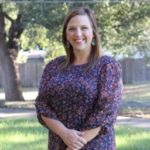 Brooke Davilla is the Director of MCH Family Outreach Waco for Methodist Children’s Home. She graduated from Baylor University with a MSW in Social Work, concentration in Community Practice, where she now teaches part-time. Brooke is passionate about cultivating a trauma informed community and is a TBRI® Practitioner. She enjoys spending time with her husband and two sons traveling, being in nature and often at the baseball fields. You can reach Brooke at [email protected].
Brooke Davilla is the Director of MCH Family Outreach Waco for Methodist Children’s Home. She graduated from Baylor University with a MSW in Social Work, concentration in Community Practice, where she now teaches part-time. Brooke is passionate about cultivating a trauma informed community and is a TBRI® Practitioner. She enjoys spending time with her husband and two sons traveling, being in nature and often at the baseball fields. You can reach Brooke at [email protected].
The Act Locally Waco blog publishes posts with a connection to these aspirations for Waco. If you are interested in writing for the Act Locally Waco Blog, please email [email protected] for more information.
By Jessica Russell Morrow
I have lived in Waco, Texas, since July 2012 and am a mother to two Boys (2 ½ and 5 months).
When I was a kid, my parents enrolled me in tons of extracurricular activities including softball, piano, basketball, bowling and golf. However, the one activity that stuck with me the most was Soccer. I grew up idolizing Mia Hamm, Brandi Chastain, Julie Foudy, Kristine Lilly, Joy Fawcett and Abby Wambach.
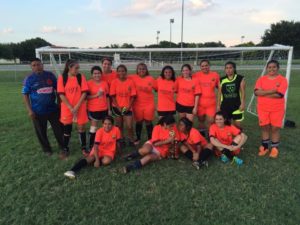 My interest in the sport was kindled by a supportive environment. I played throughout high school for both my high school and the Olympic Development Program. I remember the bittersweet moment of taking of my cleats at the end of the championship game my senior year of high school thinking, “This is it, I guess I won’t need these anymore.” I thought about giving away my cleats and shin guards. If I wasn’t going to play in college why would I ever need them again?
My interest in the sport was kindled by a supportive environment. I played throughout high school for both my high school and the Olympic Development Program. I remember the bittersweet moment of taking of my cleats at the end of the championship game my senior year of high school thinking, “This is it, I guess I won’t need these anymore.” I thought about giving away my cleats and shin guards. If I wasn’t going to play in college why would I ever need them again?
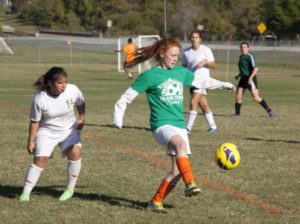 I ended up packing my cleats when I left for college thinking that there was a tiny chance I would get to use them again. Within the first week I found myself making new friends and playing pickup games. I ended up joining a co-ed intramural team that stuck together through college. After college I was sure that my soccer playing really was at an end. However, I was wrong again as I found pickup games and co-ed leagues for adults almost immediately. When I moved to Boston for graduate school there were so many different adult soccer leagues for me to join I could play every day of the week if I wanted. In 2012, my husband and I picked up our lives moved to Waco, Texas. It took me several months to adjust to the heat before finding the Waco Women’s Soccer League.
I ended up packing my cleats when I left for college thinking that there was a tiny chance I would get to use them again. Within the first week I found myself making new friends and playing pickup games. I ended up joining a co-ed intramural team that stuck together through college. After college I was sure that my soccer playing really was at an end. However, I was wrong again as I found pickup games and co-ed leagues for adults almost immediately. When I moved to Boston for graduate school there were so many different adult soccer leagues for me to join I could play every day of the week if I wanted. In 2012, my husband and I picked up our lives moved to Waco, Texas. It took me several months to adjust to the heat before finding the Waco Women’s Soccer League.
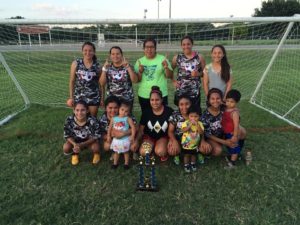 The Waco Women’s Soccer League is a Saturday morning soccer league that plays across the street from the HOT soccer fields off Airport Road. The league is run by a few dedicated volunteers and functions with the help of a great relationship with the Texas Association of Sports Officials. Games are 7v7 including goalies. All the players in the league are busy women with a passion for playing. Unlike the sports I played growing up, we don’t practice during the week. Players show up ready to have fun and dedicate themselves to two 30 minute halves before going about the rest of their Saturday.
The Waco Women’s Soccer League is a Saturday morning soccer league that plays across the street from the HOT soccer fields off Airport Road. The league is run by a few dedicated volunteers and functions with the help of a great relationship with the Texas Association of Sports Officials. Games are 7v7 including goalies. All the players in the league are busy women with a passion for playing. Unlike the sports I played growing up, we don’t practice during the week. Players show up ready to have fun and dedicate themselves to two 30 minute halves before going about the rest of their Saturday.
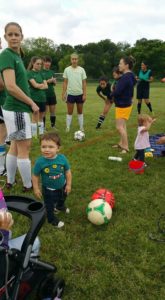 I have played with a team called the Grass Stains since finding this league. My team ranges in age from 19 to late 40s. Since joining, I have met many wonderful women and learned the power of women supporting women. This team has provided invaluable support to its players on and off the field. Off the field we have had players graduate high school, college, graduate, and law school; get married; have babies and return to playing after having babies; suffer injuries (both related and unrelated to soccer); complete marathons, triathlons and road races; and travel the world.
I have played with a team called the Grass Stains since finding this league. My team ranges in age from 19 to late 40s. Since joining, I have met many wonderful women and learned the power of women supporting women. This team has provided invaluable support to its players on and off the field. Off the field we have had players graduate high school, college, graduate, and law school; get married; have babies and return to playing after having babies; suffer injuries (both related and unrelated to soccer); complete marathons, triathlons and road races; and travel the world.
We have women who played Division 1 collegiate soccer passing along with 18 year olds fresh out of high school soccer. We have players who haven’t touched a soccer ball in a decade and those who find a way to play every day of the week. We have moms, daughters, yogis, runners, cross fitters, triathletes, bikers, artists, singers, wives, lawyers, nurses, doctors, teachers, coaches, veterinarians, professors, students, chefs, administrative assistants, restaurant servers, and UPS managers. However, our identity off the field doesn’t matter as we all share a common love for the game of soccer.
The Spring 2018 season is about to start and I am excited to get out there and look like an idiot as it will be my first full season since having my second son 5 months ago. I have done this post-partum journey before as I have a 2 ½ year old boy. I love having my sons on the sidelines cheering me on. My team has an entire cheering section with Husbands, Pets, Babies, Toddlers, Parents and friends. Teams recognize that family is important and many take turns watching kids on the sidelines while moms go play. We have several Dads who come to help on the sidelines as well.
I now have two boys, a 2 ½ year old and a 5-month-old. I am excited to introduce them to some of my passions and hope to be able to encourage them to develop a lifelong passion and excitement for something. My two year old is always watching what I do, so I am proud to have him watch me participate in sports. Sports, in general, has provided me with a therapeutic outlet and allowed me to make friends in where ever I go. Maybe my kids will like soccer, maybe they will enjoy something else… all current signs point to a passion for eating cheese and knocking over blocks.
Maybe athletics isn’t your outlet, but If it is, I encourage you to try out one of the many family friendly sports opportunities in Waco. So, ladies…Come Out and Play!
The Spring Season starts forming teams April 7th! (Just show up at 9 AM and we can get you placed on a team). Signing up doesn’t actually commit you to playing every Saturday. Many teams have players come when they can.
What to Bring:
- Shin Guards (must be worn during regular season games)
- Water Bottle
- $35 for League Fees
- Cleats (recommended)
- Goalie Gloves (if interested in a goalie position)
This great organization offers all kinds of adult sports ranging from volleyball to dodgeball to flag football
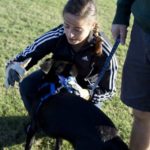 Jessica Morrow grew up in a military family and had the opportunity to live many places including California, Washington, Virginia, South Korea, Italy, Germany and Belgium. She settled in the U.S. after high school and attended James Madison University in Harrisonburg, Virginia where she earned a B.A. in English. She then went on to earn an M.A. in English at Northeastern University in Boston, Massachusetts. She moved with her (then) fiancé to Waco, Texas in 2012. He works as an Engineer at SpaceX. Jessica is currently the Assistant Director of Stewardship at Baylor University. Jessica and her Husband have two boys, (age 2 ½ and 5 months). She enjoys Hanging out with her family, Playing soccer, Running, Travelling, CrossFit and Yoga.
Jessica Morrow grew up in a military family and had the opportunity to live many places including California, Washington, Virginia, South Korea, Italy, Germany and Belgium. She settled in the U.S. after high school and attended James Madison University in Harrisonburg, Virginia where she earned a B.A. in English. She then went on to earn an M.A. in English at Northeastern University in Boston, Massachusetts. She moved with her (then) fiancé to Waco, Texas in 2012. He works as an Engineer at SpaceX. Jessica is currently the Assistant Director of Stewardship at Baylor University. Jessica and her Husband have two boys, (age 2 ½ and 5 months). She enjoys Hanging out with her family, Playing soccer, Running, Travelling, CrossFit and Yoga.
By Jessica Maxwell
Being a professional transit operator isn’t easy, although many make it look that way. Professional operators must memorize routes, adhere to schedules, check and collect fares, give directions, answer questions, obey traffic laws, remember passenger requests, exercise sound judgment in stressful or emergency situations, assist passengers of all abilities and endure an array of weather conditions– all while safely maneuvering oversized vehicles through tight spaces and unpredictable traffic. An operator’s work day starts and ends with a complete pre/post-trip vehicle inspection, and any issues are reported to maintenance personnel. Safety is a top priority.
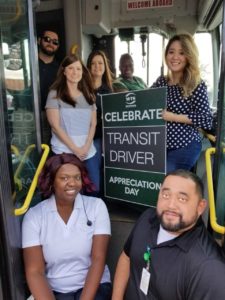 It’s a demanding career, but a rewarding one. People rely upon public transportation for increased mobility, affordable access to essential needs and improved quality of life. Those fortunate enough to own their vehicle might not always recognize the importance of public transportation, but professional operators witness, firsthand, its direct impact on the lives of passengers.
It’s a demanding career, but a rewarding one. People rely upon public transportation for increased mobility, affordable access to essential needs and improved quality of life. Those fortunate enough to own their vehicle might not always recognize the importance of public transportation, but professional operators witness, firsthand, its direct impact on the lives of passengers.
Waco Transit System, along with other transit agencies across the country, celebrated National Transit Driver Appreciation Day on Friday, March 16. This effort was started as a way to honor the hard-working men and women who keep our nation moving on a daily basis. With more than 1.3 million passenger trips in 2017 alone, Waco Transit System’s operators are certainly kept busy, and we are grateful for their service and commitment to our passengers and the community. Professional operators, along with vehicle maintenance personnel and other staff who work behind-the-scenes, deserve our heartfelt thanks and appreciation. A simple smile or wave when you board and a sincere “thank you” as you leave can go a long way.
While we believe every day is a good day to let your driver know how much they’re appreciated, it’s wonderful to see the country come together on one nationally-recognized day to celebrate the vital role professional operators play in public transportation.
For more information about this national effort, visit www.transitdriverday.org.
Have you thanked your professional operator(s) lately? Let us know why you appreciate your driver(s), and we’ll be sure to pass along your comments. Drop us a line at [email protected], Tweet us @WacoTransit or post a comment to our Facebook page (https://www.facebook.com/WacoTransit/).
 Jessica Maxwell is the Director of Marketing for Waco Transit System. She graduated from Northern Illinois University with a BA in Journalism and Communication Studies. Originally from Illinois, she moved to Texas with her husband in 2013, and they have been happily settled in Waco ever since. She enjoys spending time with her family, traveling and experiencing all the great outdoors has to offer. You can reach Jessica at [email protected].
Jessica Maxwell is the Director of Marketing for Waco Transit System. She graduated from Northern Illinois University with a BA in Journalism and Communication Studies. Originally from Illinois, she moved to Texas with her husband in 2013, and they have been happily settled in Waco ever since. She enjoys spending time with her family, traveling and experiencing all the great outdoors has to offer. You can reach Jessica at [email protected].
The Act Locally Waco blog publishes posts with a connection to these aspirations for Waco. If you are interested in writing for the Act Locally Waco Blog, please email [email protected] for more information.
By Jill Barrow
Last October I failed retirement! But, in a good way…
I was honored to be asked to assume the duties of Interim Executive Director of The Historic Waco Foundation. Since then I have been getting the question more and more often — “What does Historic Waco do?
One thing Historic Waco is known for doing is maintaining four historic homes (McCulloch House, Earle-Napier-Kinnard House, East Terrace and Fort House) and interpreting Waco’s history through them to visitors. Will we continue telling the history of Waco through these homes? Yes! In fact, these fine homes will be open to the public more often.
East Terrace and Earle-Napier-Kinnard will become our main stage through which to share the cultural history of Waco. Even though the homes were built in the late 1800’s, they were occupied until the mid-1900’s. By changing the collections within the homes, we can interpret different decades of Waco history, and share the cultural history of more than just the small period of time we currently interpret. We will have one house focusing on one decade and the other on a different time period. And we will change the interpretation every year or two. This will allow us to share the stories of all the diverse cultures in Waco, and not just the history of the original families of these homes. The houses will become a backdrop or stage for presenting Waco’s cultural history. You can visit the houses again and again and have a different experience.
East Terrace will also become the site of our large temporary exhibits. Being able to have these exhibits on the first floor will make them accessible to all. Earle-Napier-Kinnard will have a community space, where community group can display items and share stories of their culture and history.
We need the public to visit the homes, and plan on offering McCulloch as a rental facility. The downstairs parlor and dining room are perfect for small weddings and meetings. This house has a working kitchen and dressing areas, and all of the rentable areas are on the first floor, making this house very accessible. Just imagine sitting in the parlor where Mrs. McCulloch taught piano or entertained guests. McCulloch House will still be open as a house museum for visitors to see how the Caldwells and their 5 children lived in a two-room cabin, and the McCullochs built the fine two story adjacent structure to house their 10 children.
The homes are part of the answer to the question, “What does Historic Waco do?” but there is more…and that’s where you come in!
Historic Waco is the storyteller of Waco history. That is what our answer should be. Our mission is to preserve and to present the history of Waco – and that means that we interpret the history of Waco through artifacts and stories. When the Waco Indians settled this area, they told stories about their life here, and left an oral history along with the archeological data. George Barnard opened his Indian trading post in 1844 and left a fascinating history in his record books – records that tell the story of people and objects sold and traded. Neil McLennan shared stories of the beauty of this area and enticed others to come settle here. Jacob de Cordova and George B. Erath shared their vision of a new town called Waco through stories of what was offered here. The families who built and lived in the four homes Historic Waco maintains, the Forts, the McCullochs, the Earles, the Napiers and Kinnards, and the Manns, all left stories of their lives in those homes through their letters and journals.
Storytelling and education go hand in hand. Historic Waco is expanding its educational programs to include monthly Family Fundays held at the historic houses. The themes of the monthly Family Fundays relate to the month and to the history of the house. We have wonderful programs to offer schools and their students. There are different themes for the school programs; medicine, games, holidays, etiquette, transportation and migration, architecture, and the good ole days! Teachers can also check out traveling trucks to use in their classrooms. Adults can come to our fall and spring lectures. Families can join in the fun and festivities of our Texas Independence Day Celebration on March 2, on the grounds of East Terrace, or visit with Santa and see our homes all decked out for Christmas the second weekend of December.
Because Historic Waco is more than just four historic homes, we must continue sharing this city’s history. We need volunteers, sponsors and others who want to step up and assist us with this challenge. Preserving history and story-telling can be difficult in this modern world, but it is imperative that we do so. We need people who are passionate about all aspects of the cultural history of Waco and who are willing to share the stories.
Can we count on you to join us as we change to be able to tell the story of Waco, past and present? If so, contact us! We will put you to work!
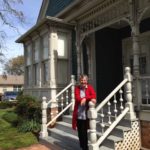 Jill Barrow is currently the Interim Executive Director of Historic Waco. She has served as the director of the Ollie Mae Moen Discovery Center, and as the Director of Education for the Mayborn Museum. She “retired” in June after teaching science for 10 years at Rapoport Academy Middle School on the Quinn campus.
Jill Barrow is currently the Interim Executive Director of Historic Waco. She has served as the director of the Ollie Mae Moen Discovery Center, and as the Director of Education for the Mayborn Museum. She “retired” in June after teaching science for 10 years at Rapoport Academy Middle School on the Quinn campus.
The Act Locally Waco blog publishes posts with a connection to these aspirations for Waco. If you are interested in writing for the Act Locally Waco Blog, please email [email protected] for more information.
By Jaja Chen
How do we respond following fears and experiences of bombings in our capitol – Austin, Texas?
When seeing recent news stories like these, many fears can arise for the safety of our friends, family members, peers, and our city. Amidst the fears and hearing about traumatic events, how do we continue thriving in our Wacotown?
Self-care following traumatic events that we hear about, witness, or personally experience can help us to lean into emotions and our community, as opposed to isolating ourselves. Trauma is anything that is a shock to one’s mind, body, soul, and/or spirit. Traumatic events leave us with many questions and thoughts of “Why?”
Three self-care responses in the face of traumatic events that we cannot comprehend include:
1.) Pay attention to how trauma is impacting you – Notice how you respond physically in your body as you listen to or read news articles about traumatic events that occur-not just to people around the nation or world-but also amongst racial/ethnic or diverse groups in which you identify with. Secondary trauma can occur when we hear about or witness a traumatic event, even if the event was heard through a news article.
2.) Process with a trustworthy individual – Whether that is a friend, family member, mentor, or colleague, find someone you trust and can connect with to share about your experiences and responses to trauma. This may even mean reaching out to a confidential hotline* first before speaking with someone you know in person. Connect with loved ones who may be feeling the same way as you or who may have been impacted by the same or similar events. At times, taking care of yourself can also mean doing your own processing work with a therapist prior to sharing about what happened to others around you.
3.) Demonstrate self-compassion to yourself – We must recognize that trauma has a ripple effect. Our communities are impacted by trauma. Simply paying attention to how you feel in response to trauma is an act of self-compassion. And connecting with others to see how they are doing helps demonstrate empathy and compassion. You are not alone. As we experience the full array of emotions in response to traumatic events, kindness and grace for ourselves in the process of healing helps us to mindfully press in to self-care as opposed to judgment, isolation, or over-identification with unpleasant emotions – to the point of unhealthy coping.
For many of us, the experience of traumatic events-either direct or indirect-may lead us to reach out to a licensed mental health professional to work through the emotions, thoughts, and physical impacts of traumatic events in our lives. Trauma can impact our physical health as our bodies store can traumatic memories physically. Reach out to someone today -whether that is a friend, safe family member, or peer to enhance your self-care and to help our community to thrive.
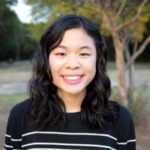 Jaja Chen, LMSW, CDWF-Candidate, is private practice therapist in Waco through Enrichment Training & Counseling Solutions specializing in trauma and difficult life transitions. As an EMDR Trained Therapist, Jaja’s passion is walking alongside individuals whom are healing from PTSD, secondary trauma, and burnout. Jaja can be contacted via email at [email protected] or via webpage at http://enrichmenttcs.com/meet-jaja-chen/
Jaja Chen, LMSW, CDWF-Candidate, is private practice therapist in Waco through Enrichment Training & Counseling Solutions specializing in trauma and difficult life transitions. As an EMDR Trained Therapist, Jaja’s passion is walking alongside individuals whom are healing from PTSD, secondary trauma, and burnout. Jaja can be contacted via email at [email protected] or via webpage at http://enrichmenttcs.com/meet-jaja-chen/
*If you are currently experiencing a mental health crisis in response to traumatic events, dial 911. If you are experiencing hopelessness or suicidal thoughts, call the National Suicide Prevention Lifeline at 1-800-273-TALK (8255), 24 hours a day, 7 days a week. The service is available to everyone. The deaf and hard of hearing can contact the Lifeline via TTY at 1-800-799-4889. All calls are confidential.
